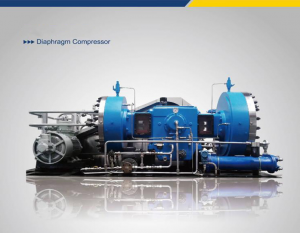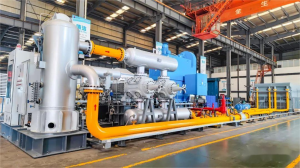1. Energy generation from hydrogen by compression using compressors
Hydrogen is the fuel with the highest energy content per weight. Unfortunately, the density of hydrogen in atmospheric conditions is only at 90 grams per cubic meter. In order to achieve usable levels of energy density, efficient compression of hydrogen is essential.
2. Efficient compression of hydrogen withdiaphragm compressors
One proven compression concept is the diaphragm compressor. These hydrogen compressors efficiently compress small to medium quantities of hydrogen to high and, if required, even extremely high pressures of more than 900 bar. The diaphragm principle ensures oil- and leakage free compression with excellent product purity. Diaphragm compressors operate best under continuous load. When running under an intermittent operation regime the lifetime of the diaphragm can be lower and servicing could be increased.
3. Piston compressors for compressing large amounts of hydrogen
If high quantities of oil-free hydrogen with less than 250 bar pressure are needed, the many thousand-fold proven and tested dry running piston compressors are the answer. Far more than 3000kW of drive power can efficiently be used to fulfill any hydrogen compression requirement.
For high volume flows and high pressures, the combination NEA Piston stages with diaphragm heads on a “hybrid” compressor offers a veritable hydrogen compressor solution.
1. Why Hydrogen? (Application)
Storage and transport of energy using compressed hydrogen
With the Paris Agreement of 2015 , By 2030 the greenhouse gas emissions shall be reduced by 40 % in comparison to 1990. In order to achieve the necessary energy transition and to be able to couple the sectors heat, industry and mobility with the electricity producing sector, independent from weather conditions, alternative energy carriers and storage methods are necessary. Hydrogen (H2) has a huge potential as an energy storage medium. Renewable energy such as wind, solar or hydro power can be converted into Hydrogen and then be stored and transported with the help of hydrogen compressors. In this way a sustainable usage of natural resources can be combined with prosperity and development.
4.1Hydrogen compressors at petrol stations
Together with Battery Electric Vehicles (BEV) Fuel Cell Electric Vehicles (FCEV) with hydrogen as a fuel are the big topic for the mobility of the future. Standards are already in place and they currently demand discharge pressures up to 1,000 bar.
4.2Hydrogen fueled road transport
The focus for hydrogen fueled road transport lies on the freight transportation with light and heavy trucks and semis. Their high energy demand for long endurance combined with short refueling times cannot be fulfilled with battery technology. There are already quite a few providers of hydrogen fuel cell electric trucks on the market.
4.3Hydrogen in rail-bound transport
For rail-bound transport in areas without overhead line power supply, hydrogen powered trains can substitute the usage of diesel-powered machines. In many countries in the world the first handful of hydrogen-electric with an operational range of more than 800 km (500 miles) and top speeds of 140kph (85 mph) are already operational.
4.4Hydrogen for climate neutral zero emission maritime transport
Hydrogen also finds its way into climate neutral zero emission maritime transport. The first ferries and smaller freight ships sailing on hydrogen currently undergo intense testing. Also, synthetic fuels made from hydrogen and captured CO2 are an option for climate neutral maritime transport. These tailor-made fuels can also become the fuel for the aviation of the future.
4.5Hydrogen for heat and industry
Hydrogen is an important base material and reactant in chemical, petrochemical and other industrial processes.
It can support the efficient sector coupling in the Power-to-X approach in these applications. Power-to-Steel for example has the goal of “de-fossilizing” steel production. Electric power is used for smelting processes. CO2 neutral Hydrogen can be used as a substitute for coke in the reduction process. In refineries we can find the first projects which use hydrogen generated by electrolysis e.g. for desulphurization of fuels.
There are also small-scale industrial applications ranging from fuel cell powered fork-lifts to hydrogen fuel cell emergency power units. The latter supply, same as the micro fuel cells for houses and other buildings, power and heat and their only exhaust is clean water.
Post time: Jul-14-2022



